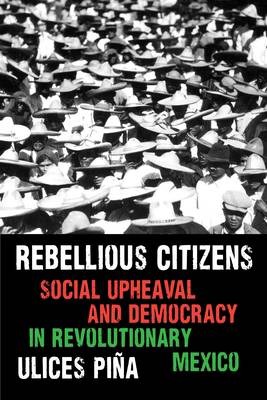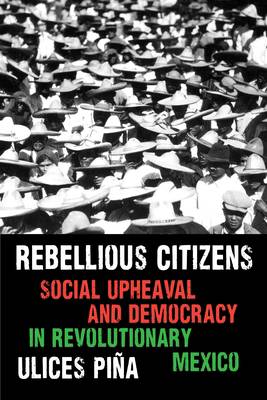
- Afhalen na 1 uur in een winkel met voorraad
- In januari gratis thuislevering in België
- Ruim aanbod met 7 miljoen producten
- Afhalen na 1 uur in een winkel met voorraad
- In januari gratis thuislevering in België
- Ruim aanbod met 7 miljoen producten
Omschrijving
In Rebellious Citizens Ulices Piña shows that democracy in Mexico has never been the exclusive domain of elites, nor confined to the ballot box. Focusing on the aftermath of the Mexican Revolution of 1910-20, Piña explores how citizens forged a substantive democratic culture in the crucible of three successive social upheavals that shook the established social order in the central western state of Jalisco during the 1920s and 1930s--a formative period in the nation's political history.
Piña examines how ordinary Mexicans actively shaped the political process, made their own history, and fought for equality in the country's long fight for democracy. The long-term effects of the recurring uprisings in Jalisco were central to the new political system produced by the postrevolutionary state: After each rebellion, authorities consolidated institutional power, elected officials debated the strictures of government, and ordinary people grappled with the promise and limits of political emancipation. Because of the contradictions that arose from the creation of this modern political system, especially those that emerged at the nexus of democratic inclusion and authoritarian rule, seemingly powerless populations claimed equality, exercised participation rights, and demanded respect, even amid the violence and surveillance the state deployed against marginal groups to achieve its goals. Rebellious Citizens brings into focus the struggles of ordinary people to experiment with new ways of doing politics to remake the nation.
Specificaties
Betrokkenen
- Auteur(s):
- Uitgeverij:
Inhoud
- Aantal bladzijden:
- 258
- Taal:
- Engels
- Reeks:
Eigenschappen
- Productcode (EAN):
- 9781496246226
- Verschijningsdatum:
- 1/07/2026
- Uitvoering:
- Hardcover
- Formaat:
- Genaaid
- Afmetingen:
- 152 mm x 229 mm

Alleen bij Standaard Boekhandel
Beoordelingen
We publiceren alleen reviews die voldoen aan de voorwaarden voor reviews. Bekijk onze voorwaarden voor reviews.









